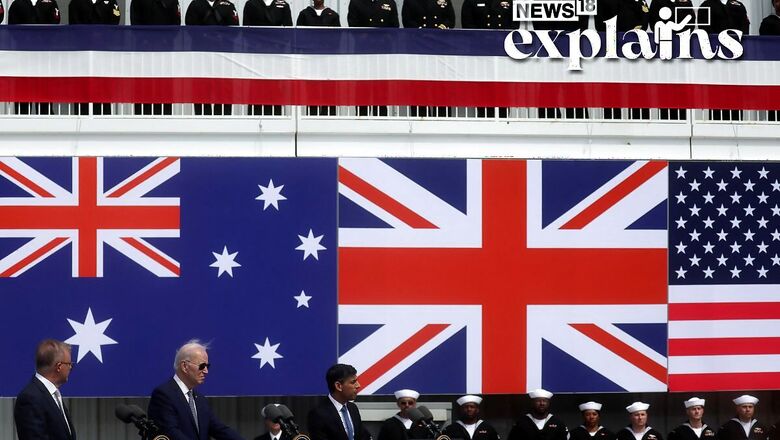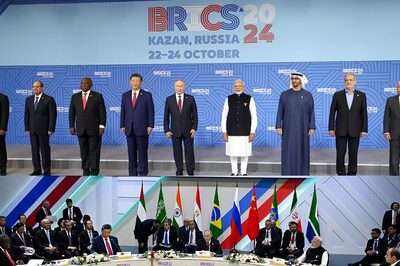
views
The United States, Australia and the United Kingdom are traveling “further down the wrong and dangerous path for their own geopolitical self-interest,” China’s Foreign Ministry said Tuesday, responding to an agreement under which Australia will purchase nuclear-powered attack submarines from the U.S. to modernize its fleet.
Spokesperson Wang Wenbin said the arrangement, given the acronym AUKUS — for Australia, the United Kingdom and the United States — arises from the “typical Cold War mentality which will only motivate an arms race, damage the international nuclear nonproliferation regime, and harm regional stability and peace.”
U.S. President Joe Biden flew to San Diego to appear with Australian Prime Minister Anthony Albanese and British Prime Minister Rishi Sunak as they hailed an 18-month-old nuclear partnership that enables Australia to access nuclear-powered submarines, which are stealthier and more capable than conventionally powered vessels, as a counterweight to China’s military buildup.
Democracies like ours deliver for our own security – and for the entire world. pic.twitter.com/N5hXBpe4C9— President Biden (@POTUS) March 14, 2023
Biden emphasized the ships would not carry nuclear weapons of any kind. Albanese has said he doesn’t think the deal will sour its relationship with China, which he noted had improved in recent months.
But What is AUKUS? News18 Explains:
AUKUS is the term given to the security agreement reached by Australia, the United Kingdom, and the United States (A-UK-US) in the end of 2021. The first and largest part of the agreement is the submarine contract, also known as Pillar One.
Both the United Kingdom and the United States, which have nuclear-powered submarines, agreed to collaborate with Australia and provide schematics for their subs so that Australia might build its own, explains a report by ABC.
The second AUKUS pillar will involve improving our defence capabilities with the assistance of the UK and the US in general.
Biden views the partnerships and alliances in the region as cornerstones for U.S. strategy for years to come. Asked if AUKUS would survive if a new, more isolationist president was elected — a veiled reference to Donald Trump, who is running for another term — Biden said yes.
The secretly brokered AUKUS deal included the Australian government’s cancellation of a $66 billion contract for a French-built fleet of conventional submarines, which sparked a diplomatic row within the Western alliance that took months to mend.
What is the Latest Announcement
President Joe Biden and the leaders of Australia and the United Kingdom on Monday announced that Australia will purchase nuclear-powered attack submarines from the U.S. to modernize its fleet amid growing concern about China’s influence in the Indo-Pacific.
Biden flew to San Diego to appear with Australian Prime Minister Anthony Albanese and British Prime Minister Rishi Sunak as they hailed an 18-month-old nuclear partnership given the acronym AUKUS — for Australia, the United Kingdom and the United States.
The partnership, announced in 2021, enables Australia to access nuclear-powered submarines, which are stealthier and more capable than conventionally powered vessels, as a counterweight to China’s military buildup.
Biden, appearing sensitive to tensions with China and its criticism of the deal, stressed that the submarines are “nuclear powered, not nuclear armed.”
Alongside Australia and the United Kingdom, we're developing a new state-of-the-art submarine to ensure the Indo-Pacific stays open and secure. We'll bring together our militaries, scientists, engineers, and shipbuilders – and create good-paying jobs while doing it.
— President Biden (@POTUS) March 14, 2023
“These boats will not have any nuclear weapons of any kind of them,” he said at an outdoor ceremony at Naval Base Point Loma in San Diego, where he was flanked by Albanese and Sunak. Two submarines, the USS Missouri and the USS Charlotte, were tied up at the next pier in the Pacific Ocean behind the leaders.
Albanese said the agreement “represents the biggest single investment in Australia’s defense capability in all of our history.” It’s also the first time in 65 years that the U.S. has shared its nuclear propulsion technology, ”and we thank you for it,” he said.
Sunak called AUKUS “the most significant multilateral defense partnership in generations.” He said the U.K. also will share its 60 years of experience running its own submarine fleet with Australian engineers “so they can build their own fleet.”
China Spooked?
Wang repeated China’s claims that AUKUS poses a “serious risk of nuclear proliferation and violating the object and purpose of the Treaty on the Non-Proliferation of Nuclear Weapons.”
“The three countries claim that they will abide by the highest nuclear non-proliferation standards, which is pure deception,” Wang said, accusing the three of “coercing” the International Atomic Energy Agency into giving its endorsement.
China has argued that the AUKUS deal violates the Nuclear Non-Proliferation Treaty. It contends that the transfer of nuclear weapons materials from a nuclear-weapon state to a non-nuclear-weapon state is a “blatant” violation of the spirit of the pact. Australian officials have pushed back against the criticism, arguing that they are working to acquire nuclear-powered, not nuclear-armed, submarines.
Australian Defense Minister Richard Marles said it had made a huge diplomatic effort for months ahead of Monday’s announcement of the deal, including making more than 60 calls to regional and world leaders. Australia had even offered to keep China in the loop, he said.
“We offered a briefing. I have not participated in a briefing with China,” Marles said.
AUKUS is one of several U.S.-led security arrangements that have drawn fire from Beijing, which routinely rails against regional blocs from which it is excluded as vestiges of the Cold War.
Along with Russia, China has denounced the Quad — a grouping of Australia, India, Japan and the United States — whose foreign ministers earlier this month made clear they aim to be an alternative to China. The ministers said they viewed with concern “challenges to the maritime rules-based order, including in the South and East China Seas,” in a reference to China’s aggressive moves to assert its territorial claims in a quest to replace the U.S. as the region’s preeminent military force.
China has also been unsettled by an agreement between Washington and the Philippines, giving U.S. forces greater access to Filipino bases along what is called the “first island chain” that is key to Chinese control of the region.
U.S. military and political support for Taiwan have also drawn more threatening responses from Beijing in recent years.
A 2022 visit to the island by then-House Speaker Nancy Pelosi prompted Beijing to fire missiles over the island, send ships and warplanes into the area and hold military exercises in a simulated blockade of the island. Amid tensions over the U.S. shooting down a suspected Chinese spy balloon in February, China refused to accept a phone call from U.S. Defense Secretary Lloyd Austin to discuss the matter.
With inputs from Associated Press
Read all the Latest Explainers here




















Comments
0 comment